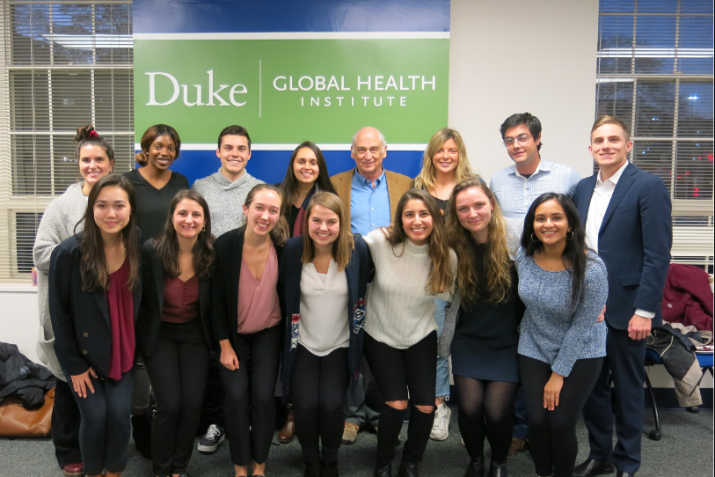
Capstone instructor Dennis Clements (center) with Fall 2019 Global Health Capstone students.
Published December 16, 2019, last updated on March 26, 2020 under Education News
Earlier this month, four undergraduate teams showcased their final projects at the Global Health Undergraduate Capstone Poster Presentations event at DGHI’s Trent Street offices. Their posters were the culmination of a Fall 2019 Global Health Capstone course.
Under the mentorship of Capstone instructor Dennis Clements, professor and director of undergraduate studies for global health, each team conducted research on a real-world problem, consulted with experts in the field and developed solutions. Capstone teams explored a variety of global health topics, including mental health, nutrition and vaccination.
The teams, each made up of Duke seniors who are either global health majors or program II majors—students who create their own majors during their sophomore year by combining global health coursework with classes in other related fields—applied the knowledge they’ve gained throughout their years at DGHI. All took a “local is global” approach in their research.
“The Capstone projects have evolved over the ten years I’ve been doing this course. When we started, a lot of the projects were international and now most are focused locally. They’re more applicable to the current needs in the community,” Clements says.
One team, for example, worked to address gaps in HPV vaccination coverage among Hispanic populations in Durham. They designed an education campaign that used Facebook advertisements, a bilingual website and brochures to disseminate information about vaccines to the community. The group also created a framework for pop-up vaccination events every six months in schools, workplaces and churches to make getting vaccines more accessible.
Another team collaborated with El Centro Hispano, a nonprofit organization in Durham dedicated to strengthening the community, building bridges and advocating for equity and inclusion in the Triangle area. They created an eight-class curriculum focused on mental health, relationships, and nutrition. Each class has an educational component as well as activities that offer practical skills to attendees.
The Capstone projects explored topics in a variety of communities and included one team that studied mental health in school-age children from under-resourced areas following natural disasters. The Capstone students worked closely with an elementary school to design an intervention that used mindfulness meditation as a way to help youngsters deal with trauma after a natural disaster.
Another group focused on mental health issues among the homeless population in Durham. The team developed a two-pronged intervention that uses either weekly peer support networks or loosely structured group meetings to target a certain coping mechanism. They also planned a monthly speaker series where past clients share their stories about homelessness and mental health issues and how they were able to break the cycle.
In some cases, where there’s potential for implementation in the community with local partners, students will continue their projects after graduation.
“The Capstone projects give students the opportunity to work with local neighborhoods and experts and to actually provide something that will be useful to them. And the projects show that Duke is a good partner in the community and can offer something very practical,” Clements says.
